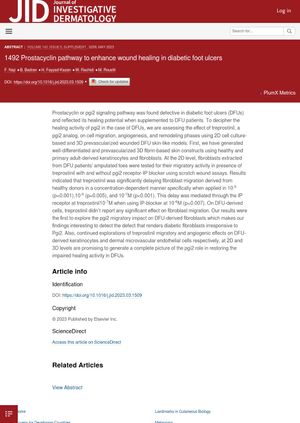Prostacyclin Pathway to Enhance Wound Healing in Diabetic Foot Ulcers
April 2023
in “
Journal of Investigative Dermatology
”

TLDR Treprostinil, a drug, can delay wound healing in healthy cells but doesn't affect diabetic foot ulcer cells, suggesting further research could help understand its role in treating these ulcers.
The study investigated the healing potential of the prostacyclin or pgi2 signaling pathway in diabetic foot ulcers (DFUs). The researchers assessed the effect of treprostinil, a pgi2 analog, on cell migration, angiogenesis, and remodeling phases using 2D cell culture-based and 3D prevascularized wounded DFU skin-like models. The results showed that treprostinil significantly delayed fibroblast migration derived from healthy donors in a concentration-dependent manner. However, on DFU-derived cells, treprostinil didn't have any significant effect on fibroblast migration. This study is the first to explore the pgi2 migratory impact on DFU-derived fibroblasts, which could help understand why diabetic fibroblasts are irresponsive to Pgi2. Further research on treprostinil's migratory and angiogenic effects on DFU-derived keratinocytes and dermal microvascular endothelial cells is promising for a complete understanding of the pgi2 role in restoring the impaired healing activity in DFUs.




